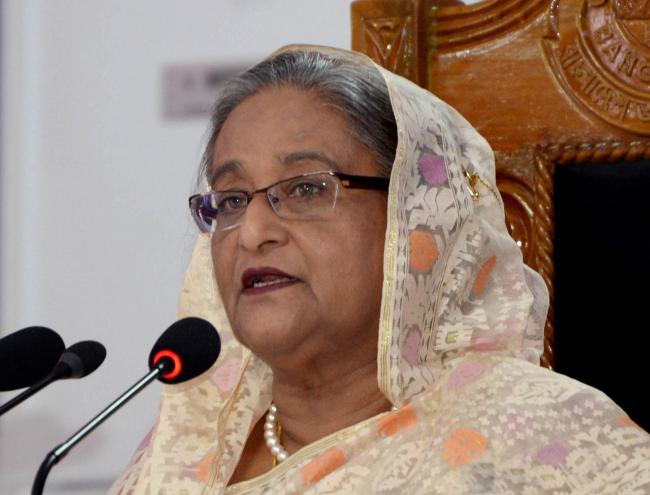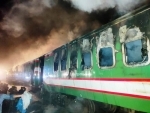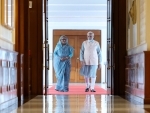Column

Sheikh Hasina Government nearing end of its second term
Under Sheikh Hasina’s leadership Bangladesh witnessed significant successes in infrastructure development, poverty alleviation, power generation, nutrition, maternal and child health, primary education and women empowerment.
In every aspect of socio-economic indicator, the country has earned impressive achievements and is now marching ahead with attaining continuous growth, raising per capita income, implementing mega projects.
{special_block_1}Bangladesh’s economy has posted a GDP rate of 7.28 per cent, a foreign currency reserve of $ 32.1 billion and exports worth $ 38.5 billion in fiscal year 2016-17. The country has become a lower middle-income country and will become a middle- income nation if it achieves an average per capita income of $ 1,045 for 3 consecutive years as per World Bank criteria. Now per capita income has surged to $ 1,610.
Bangladesh has witnessed the rise of a vibrant middle class and shrinking of people living below poverty line. Currently less than 12 per cent live below the abject poverty line, a remarkable change from the 2001-06 rule by Khaleda Zia’s BNP when this number was 42 per cent (Bangladesh Bureau of Statistics).
The lives of 162 million people are being transformed in to a digitalized knowledge-based society, thanks to the present government’s ‘Digital Bangladesh’ vision. Bangladesh now tops the South Asian countries in gender parity and ranks 7th globally in women empowerment (Global Gender Gap Report 2016).
The country’s agriculture sector witnessed major development with attaining self-reliance in meeting demands of staple food grains. Economists are of the view that a shift from once agriculture-driven country to a more service and industry-oriented economy has led the country to economic prosperity with dependence on foreign aids and imports decreasing.
The biggest news in the economic frontier is the country graduating from Least Developed Country (LDC) status to the developing country status. It is most likely that by 2024 Bangladesh will become a member of the developing countries.
The country has recently launched its own satellite ‘Bangabandhu-1’ to become the 57th country to do so. The country is now placed among the next emerging eleven economic powerhouses.{special_block_2}
During Khaleda Zia’s rule about 60 per cent of the budget came from the donor countries and agencies. Currently 90 per cent of Bangladesh’s annual recurring budget is financed from internal sources, 8 per cent from soft loans and 2 per cent from aids (Bangladesh Bureau of Statistics).
Corruption became endemic and was institutionalized during BNP rule. Berlin based Transparency International ranked Bangladesh as number one corrupt country in the world. Corruption in many sectors is still a big problem but the difference between the regime of Khaleda Zia and Sheikh Hasina is that now anyone accused of corruption is brought before the law which was unthinkable during the previous regime.
The five-year (2001-06) Khaleda Zia rule witnessed various misdeeds of the BNP and its allies. Grenade attacks on the Awami League rally in August 2004 targeting Sheikh Hasina, countrywide synchronized bomb blast, killing of senior Awami League leaders including ASMA Kibria and Ahsanullah Master, seizure of 10 truck load arms and looting of national wealth are to name only a few of the numerous misdeeds in which leaders of the BNP and its allies were involved.
The country’s infrastructure has developed miraculously since Sheikh Hasina held the reins of power. Power generation capacity has increased from 4,900 MW during BNP rule to well above 15,000 MW. A new nuclear power generation plant with Russian help and loan is being built in Rooppur with a built-in capacity of producing 2,400 MW of power at a cost of 13 billion dollars and expected to be completed by 2024. As many as 83 per cent people of the country are getting electricity as the country’s total electricity generation capacity has reached well above 15,000 MW. The construction work of Matabari Power Plant, Rampal Power Plant, Padma Rail Bridge, the Metro Rail and other infrastructure projects has been expedited.
The greatest success story of the present regime began when Sheikh Hasina decided to go ahead and build the Padma Bridge with the country’s own resources after the World Bank refused to finance the mega project. The work on Padma Multipurpose Bridge Project is progressing fast and nearly fifty six per cent work has already been completed. The construction of a tunnel in Karnaphuli river in Chittagong and Pyra Sea Port is under way. If this trend of development continues uninterrupted the world will witness the rise of an economic power house by 2021 when the country celebrates its 50th year of independence.
Side by side with all these, Sheikh Hasina brought solace for the country’s thirty lakh martyrs and their families by initiating war crimes trial and bringing the war criminals of 1971 to justice. Moreover, she drew many prestigious global accolades for setting up a unique example of humanity and peace by providing shelter to hundreds of thousands of Rohingyas fleeing ethnic cleansing in their homeland Myanmar.
With her uncompromising stance towards betterment of her countrymen and her long journey in the country’s development, it is Sheikh Hasina who holds the key to the future of Bangladesh. As of now the country does not have any alternative but to accept her as the undisputed leader to steer the nation to a brighter future.



